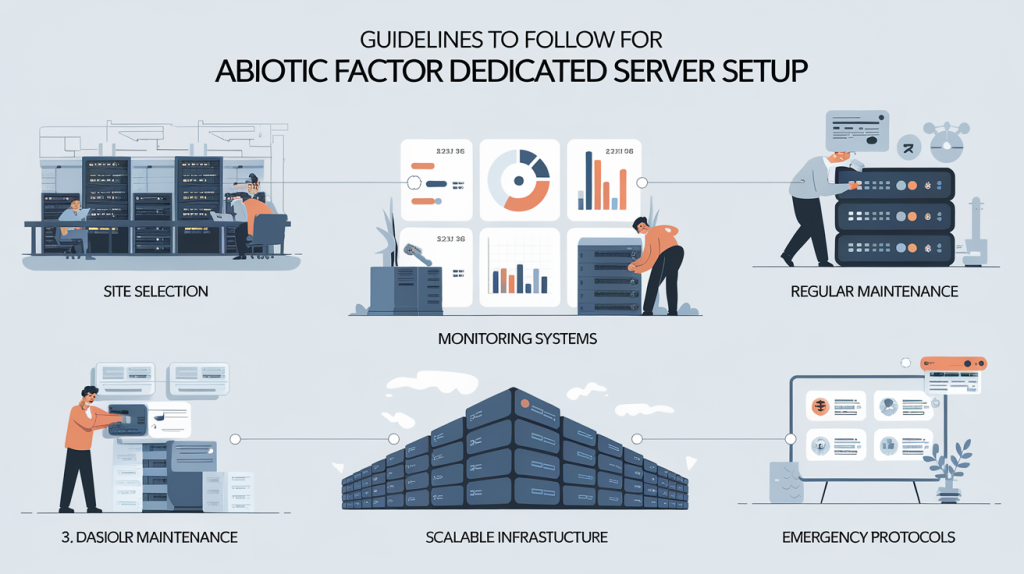Dedicated servers are the kind of physical servers that are exclusively available for users. Such servers give users complete control and resources. Dedicated servers are mainly used for high-traffic websites, e-commerce platforms, or applications that require advanced security and high performance. Common examples of dedicated servers include servers for media streaming, game servers, database servers, web servers, and application servers. However, when setting up a dedicated server, a successful deployment depends on factors beyond hardware and software—the abiotic factors play a critical role. Abiotic factors are the physical and chemical conditions of the environment into which the system is being developed, which in turn affect the system’s performance and sustainability.
In this blog, these factors are described, and advice on how to design your abiotic factor dedicated server setup to fit these parameters is given, which will promote better efficiency and a longer use of the equipment.
What are Abiotic Factors in Server Environments?
The major abiotic factors in a dedicated server setup are temperature, humidity, dust and airborne particulate matter, noise, lightning, and power fluctuations. All of these components have an impact on the server capacity and lifespan of the system.
1. Temperature Control
Servers produce a lot of heat, which presents potential for some concerns. The third Server Room management factor affecting hardware and data is the temperature, as an overheated room establishing 18-27 °C or 64-80 °F is not a good environment for computer parts to work efficiently and last long. Especially, to control the temperature, use air conditioning systems and different types of liquid cooling systems.
2. Humidity Levels
Humidity affects server performance in two ways: high density affects high humidity because it can cause corrosion, while low density affects electrostatic discharge because of low humidity. It is advisable to maintain a relative humidity level of between 40-60 percent to strike a balance.
To maintain the necessary level of moisture required within the server installation, humidity panels should be established together with the humidification and dehumidification techniques.
Read Also: Want to Uninstall the NGINX Server and Enable Apache? Here’s how
3. Dust and Air Quality
If the dust gathers in large quantities, it overheats and harms its recipient. It is also important to ensure that the server room is provided with quality filters and that the room/the hardware component needs to be cleaned often. Applying ionizers and air purifiers' physical properties can enhance the standard of air and subdue particle concentration.
4. Noise Management
Although noise hardly affects the server, it has an impact on the conditions of the environment where people who work with the server have to operate. Besides, the noise level of a workplace should also be controlled to offer comfort to the personnel; this can be done by laying barriers such as acoustic foam.
5. Electrical Stability
There are two types of servers: large servers and mid-sized servers Large servers are excessively sensitive to slight electric current fluctuations, while mid-sized servers are comparatively sensitive to changes in electric current.
Backup power units and power conditioners protect against fluctuations, voltage drops, and spikes that could further lead to loss of data and physical destruction of equipment. Also regularly review the sources of power supply and ensure your backup system is optimally working.
Read Also: In-House Server Vs. Cloud Server | What’s the key difference?
Guidelines To Follow For Abiotic Factor Dedicated Server Setup

- Site Selection: It is also better to select the server room or data center with low and stable temperatures, and minimal humidity so that less will rely on the HVAC system.
- Monitoring Systems: For abiotic factors, dedicated server setup must ensure timely rectification of these issues, temperature, humidity, and electrical input into the system must be constantly monitored.
- Regular Maintenance: Make it a habit to regulate checks plus cleaning to preserve the quality of air that is supplied besides surmounting system halts that stem from negligence.
- Scalable Infrastructure: Consider the scalability of the cooling and power systems so that they can accommodate growth in the number of servers.
- Emergency Protocols: The institution should consider establishing contingency plans for calamities about abiotic factors and practice exercise often.
Read Also: A Comprehensive Guide To Java Method Server | Benefits, Working, Etc.
Conclusion
If properly handled, the fates of the four main abiotic factors determine the efficiency and durability of the specialized abiotic factor dedicated server. This also does not only enhance the IT infrastructure but also safeguards your investment in technology.
FAQs
Why is controlling temperature important in a server setup?
It is important to control the temperature because when servers are exposed to heat the hardware is likely to fail, and the lifespan of the servers will be shortened. These factors preserve effectiveness and durability at the most suitable temperature.
In what ways does humidity impact servers?
In an abiotic factor dedicated server setup, high humidity results in corrosion and also increases the chance of an electrostatic discharge. Controlled humidity is also important in the protection of hardware as well as in achieving constant productivity.
How often should air quality be assessed in a server room?
The room environment must be monitored, at least once a month in intervals, to determine if the filters are working and if there is too much dust in the air.
What steps can be taken to reduce noise in the server environment?
To reduce noise, consider installing soundproofing materials and acoustic barriers. Ensuring the equipment is regularly maintained can also prevent excess noise from faulty machinery.
What protective measures should be in place for electrical stability?
Using UPS and surge protectors can shield servers from power surges and outages. Regularly testing these systems ensures they are ready to function in an emergency.
Related Posts:
How To Fix Payday 3 Server Status Problem in 2024?
In-House Server Vs. Cloud Server | What’s the key difference?
Incoming Mail Server for live.com, Gmail, Outlook, Yahoo, Apple Mail – IMAP and SMTP Servers
CRM Server: Plan Your Disk
TCP/IP NetBIOS Helper On or Off | What’s the Impact on Network Performance?








